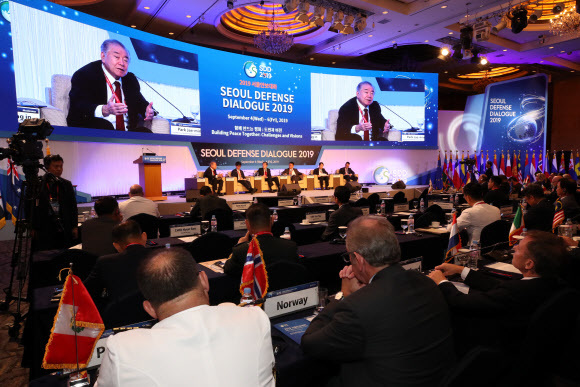 |
|
The 2019 Seoul Defense Dialogue held at the Lotte Hotel on Sept. 5.
|
US official questions N. Korea’s denuclearization intentions
During the Seoul Defense Dialogue (SDD), which was held at the Lotte Hotel Seoul on Sept. 5, a senior official in South Korea’s Ministry of National Defense and a former Japanese defense minister got into an argument over the Moon administration’s decision to terminate its intelligence-sharing agreement with Japan, known as the General Security of Military Information Agreement (GSOMIA). “It’s regrettable that this decision was made in a situation in which North Korea continues to pose a threat and make provocations. North Korea is still launching missiles,” said Satoshi Morimoto, who served as Japan’s Minister of Defense in 2012 and is currently chancellor of Takushoku University, during a debate on the theme of “The Peace Process on the Korean Peninsula and International Cooperation.” Morimoto also said that the GSOMIA question was separate from the trade dispute between South Korea and Japan and argued that “this could lead to a severe change in trilateral cooperation between the US, South Korea, and Japan.” While noting that a previous attempt to conclude GSOMIA in June 2012, during the administration of Lee Myung-bak, had collapsed after allegations of secret negotiations, Morimoto emphasized that “GSOMIA was part of an effort to strengthen the security relationship between Japan and South Korea.” South Korean Vice Defense Minister Park Jae-min countered by saying that “it was Japan that declared South Korea to be a country that can’t be trusted on security matters,” placing the blame for the GSOMIA termination on Japan. “The Japanese government reacted to the South Korean Supreme Court’s forced labor ruling by deciding to restrict certain exports on the grounds of security. We decided to terminate GSOMIA given our uncertainty about whether we could share sensitive military information with a country that has taken such action because it doesn’t trust South Korea in regard to security,” Park said. While mentioning that GSOMIA will remain in effect until the end of November, Park emphasized that “the South Korean government could positively reconsider this issue if Japan reconsiders and retracts its trade measures.” When the back and forth continued, the session moderator, Moon Chung-in, asked the discussants to exercise some restraint, noting that the “GSOMIA issue is a very sensitive, touchy subject.” “While this [debate] could be seen as helping keep the peace on the Korean Peninsula, this session must not play host to the conflict on the Korean Peninsula,” said Moon, who is the special presidential advisor for unification, foreign affairs, and national security and a professor emeritus at Yonsei University. In attendance at the debate were foreign policy and security officials and experts from South Korea, the US, Japan, China, and Russia. During the debate, Joseph Detrani, former special envoy for the Six-Party Talks with North Korea and a professor at Missouri State University, brought up the fact that North Korea hasn’t moved ahead with working-level negotiations with the US. “We’re forced to suspect that North Korea may not be prepared to denuclearize,” Detrani said. When Moon said that “the US doesn’t seem to be sending positive signals about lifting sanctions [as North Korea wants],” Detrani added that “the US has already promised to provide some degree of security guarantee.” By Yoo Kang-moon, senior staff writer Please direct comments or questions to [english@hani.co.kr]






